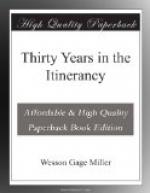It was the pioneer camp-meeting in the region, and, though the attendance was not large, it included nearly all the population of the vicinity. There were ten tents, and as many preachers, with the Presiding Elder in charge. The spirit of the meeting was excellent, and a goodly number of souls were gathered for the Master. The services were greatly enlivened, and clothed with additional interest by the presence of the several brethren whom I had brought from Brothertown. Their ready, incomparable spiritual songs, earnest prayers and touching narratives of Christian experience, awakened intense feeling among all classes, and gave abundant evidence of the power of the Gospel to save, even the red man, as well as his brother of lighter complexion and more favorable surroundings.
Another feature of the meeting fastened itself upon my memory. It was the persistence with which the good Elder pressed me into service on the Sabbath before the great congregation, and such a formidable array of ministers. It was indeed a great trial, but, as on other occasions where there is a “boy preacher” around, there was no escape. And besides, the effort took on the nature of a trial sermon, as it was my first effort after I had been duly licensed to preach. Whether I succeeded fairly or not in the estimation of my critics, I am not able to say, for I kept my ear during the balance of the meeting turned the other way, lest I might “have my feelings hurt.”
Returning to Brothertown, I now determined to hold a camp-meeting, under “our own vine and fig tree,” in July. The arrangements were accordingly made, and at the appointed time, the Presiding Elder and several other ministers came to our assistance. They were Rev. Messrs. H.R. Colman, Stephen Jones, Joseph T. Lewis, G.N. Hanson, S.B. Whipple and my dear father. The attendance was large, the order perfect, and the results of the meeting specially satisfactory.
Among the converts were several persons from Calumet, a small village of white people adjoining Brothertown on the south. We now established an appointment in the village, formed a class and opened a Sunday School.
But the time had come in the history of the Mission when a new and larger chapel must be erected. To further this object, several boxes of goods had been forwarded to the Mission by Ladies Benevolent Societies in the east. They were accordingly opened out in the rooms of the vacant Parsonage, and, when not otherwise employed, I installed myself as a salesman of merchandise. It was not a little amusing to begin the erection of a church after this fashion, but this was not the only queer thing about the building of the Brothertown Church.




